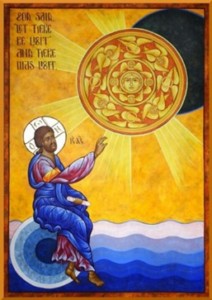“I have begotten you from the womb before the
morning star” (Psalm 109:3/110:3)

We hear a series of prophecies in the often cited Psalm 109, many of which are sung on Christmas day. Verse 3 is one such example. It is chanted on Christmas day by way of prokeimenon in the matins service, and as the entrance hymn following the small entrance during the Divine Liturgy.
Verse 3 proclaims the first birth of Christ, who is referred to as the “morning star.” It is not the only place in which this description is used. It also appears in Revelation 22:16: “I, Jesus, have sent My angel to testify to you these things in the churches. I am the Root and the Offspring of David, the Bright and Morning Star.”
Saint Athanasius interprets Psalm 109:3 as follows: “If then ‘the Offspring of David’ be the ‘Bright and Morning Star’, which the Offspring from God preceded; so that the sense of the Psalm is this, ‘I have begotten You from Myself before Your appearance in the flesh;’ for ‘before the Morning Star’ is equivalent to ‘before the Incarnation of the Word’.” In other words, Saint Athanasius explains that the morning star is Jesus and the womb is God’s; the Psalm is foretelling that Christ was born (not created) of God, rendering Him God Himself. This finds support in the Creed: “light from light, true God from true God, begotten, not made, of one essence with the Father.”
Accordingly, the Offspring, the Incarnate Word, is the morning star. God tells us in the Psalm that this morning star was born from His womb before He became the morning star. In other words, Christ has two births. His first birth is timeless; the second, on the other hand, occurs in time, in a stable, in Bethlehem, of Mary, humbly and meekly. The Psalmist and the Church remind us, and proclaim, on the great feast of Christmas Who precisely is being born on this day.
Source: Lychnos December 2021 / January 2022
